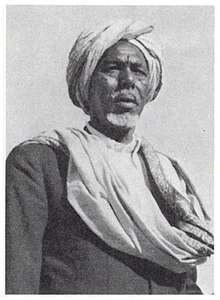Abdillahi Deria
Sultan Abdillahi Deria (Somali: Cabdillahi Diiriye) was the Grand Sultan of the Isaaq clan and a notable Somali anti-colonial figure.[1]
| Sultan Abdillahi Deria سلطان عبد الله سلطان ديريه | |
|---|---|
| 5th Grand Sultan of the Ishaaq | |
 Sultan Abdillahi Deria | |
| Reign | 1939 - 1967 |
| Predecessor | Deria Hassan |
| Successor | Rashid Abdillahi |
| Religion | Sunni Islam |
Biography
Abdillahi was the son of Sultan Deria Hassan whom he succeeded. Sultan Abdillahi was a vehement anti-colonialist and felt strongly about the cessation of Haud Reserve and the Ogaden regions to Ethiopia. In the year 1948, he led a delegation of politicians and Sultans to the United Kingdom in order to petition and pressure the government in returning the lost Somali territories.
In Imperial Policies and Nationalism in The Decolonization of Somaliland, 1954-1960, Historian Jama Mohamed writes:
The N.U.F. campaigned for the return of the territories both in Somaliland and abroad. In March 1955, for instance, a delegation consisting of Michael Mariano, Abokor Haji Farah and Abdi Dahir went to Mogadisho to win the support and co-operation of the nationalist groups in Somalia. And in February and May 1955 another delegation consisting of two traditional Sultans (Sultan Abdillahi Sultan Deria, and Sultan Abdulrahman Sultan Deria), and two Western-educated moderate politicians (Michael Mariano, Abdirahman Ali Mohamed Dubeh) visited London and New York. During their tour of London, they formally met and discussed the issue with the Secretary of State for the Colonies, Alan Lennox-Boyd. They told Lennox-Boyd about the 1885 Anglo-Somali treaties. Under the agreements, Michael Mariano stated, the British Government 'undertook never to cede, sell, mortgage or otherwise give for occupation, save to the British Government, any portion of the territory inhabited by them or being under their control'. But now the Somali people 'have heard that their land was being given to Ethiopia under an Anglo-Ethiopian Treaty of 1897'. That treaty, however, was 'in conflict' with the Anglo-Somali treaties 'which took precedence in time' over the 1897 Anglo-Ethiopian Treaty[.] The British Government had 'exceeded its powers when it concluded the 1897 Treaty and ... the 1897 Treaty was not binding on the tribes.' Sultan Abdillahi also added that the 1954 agreement was a 'great shock to the Somali people' since they had not been told about the negotiations, and since the British Government had been administering the area since 1941. The delegates requested, as Sultan Abdulrahman put it, the postponement of the implementation of the agreement to 'grant the delegation time to put up their case' in Parliament and in international organizations.[2]
See also
References
- Bureau of the public information of the government of India, p. 444. India. Bureau of Public Information. 1948.
- Mohamed, Jama (2002). Imperial Policies and Nationalism in The Decolonization of Somaliland, 1954-1960. The English Historical Review.